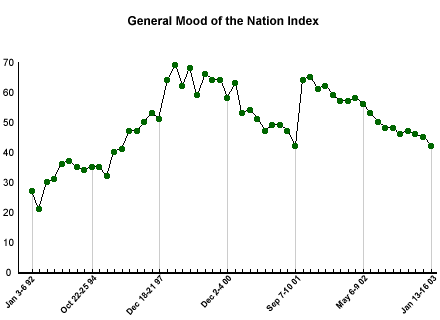🎁 AI and technological 'eucatastrophe'
Are we seeing a repeat of the surprise 1990s boom?
✈ A quick note: I will be traveling through the middle of July and will be posting a bit less than usual, and perhaps a bit shorter than usual.
Super-Short Summary: After years (decades?) of Down Wing economic stagnation and cultural malaise, America yearns for a technological breakthrough. Generative AI emerges as a potential catalyst, echoing the unexpected tech boom of the 1990s that lifted the country from a similar funk. Current AI developments show promise, with surging investments and rising market expectations. But widespread adoption remains low, and experts debate its long-term impact. Up Wing optimists see AI automating a quarter of work tasks, boosting productivity and GDP significantly. Skeptics question its cost-effectiveness and ability to solve complex problems. And those hallucinations! Despite the absence of a "killer app," many observers remain bullish on AI's transformative potential. As with previous tech cycles, AI's true impact may only become clear as it progresses from infrastructure to platforms and, finally, groundbreaking applications.
Here’s a typical question from readers of this newsletter and my 2023 book, The Conservative Futurist: “How do we break out of this Down Wing doom loop of disappointing economic growth and cultural pessimism?” In fact, I was just asked this question on a podcast.
I responded with a bit of history (a longer version of which is in my book). I reminded the pod host that the final decade of the 20th century started with America in a deep funk. That, despite the end of the Cold War and the receded threat of nuclear holocaust. The early 1990s saw economic struggles, with a nasty recession and slow “jobless” recovery dampening the vibe. On Election Day 1992, only a fifth of Americans thought the country was on the right track.
Intellectual discourse from our elites jibed this pessimism. From The Conservative Futurist:
In The True and Only Heaven: Progress and Its Critics, historian and social critic Christopher Lasch vexingly described his fellow Americans, especially the middle class despite their current pessimism, as still too enamored with the notion of progress: “How does it happen that serious people continue to believe in progress, in the face of massive evidence that might have been expected to refute the idea of progress once and for all?” That year also saw an updated version of the 1974 book An Inquiry into the Human Prospect by economist Robert Heilbroner. In the original, Heilbroner led off with the following query: “There is a question in the air, more sensed than seen, like the invisible approach of a distant storm, a question that I would hesitate to ask aloud did I not believe it existed unvoiced in the minds of many: ‘Is there hope for man?’” Not much, he concluded. To grapple with the planet’s growing population and increasing environmental degradation would inevitably require an authoritarian turn by governments everywhere and a severe diminution of human freedom.
Even through the middle of the 1990s, public satisfaction remained low. The New York Times criticized 1996 presidential candidates Bill Clinton and Bob Dole for promising unrealistic economic growth. This view echoed many economists' skepticism about the possibility of strong growth in a “mature” economy like America’s, and whether the Computer Revolution would ever have a big, measurable productivity impact.
Yet at that very moment of national malaise, a historic tech-driven productivity and economic boom was already in full swing. It was — to use a term coined by J.R.R. Tolkien — a “eucatastrophe,” a sudden and unexpected turn of events leading to a joyous conclusion.
With the economy firing on all cylinders, the public mood shifted to extreme optimism. It was, for instance, the first time I heard the word “Singularity” as a reference to technology advancing at an incomprehensible rate. Of course, neither the roaring boom nor unbridled optimism lasted much beyond the early years of the 21st century. The dot-com bubble burst, the IT investment cycle ended, 9-11 happened, the Iraq War was waged, and then the banks and housing market collapsed. Eucatastrophe reverted to plain, old catastrophe.
Another eucatastrophe would be most welcome, and generative AI seems the most likely candidate to spark an unexpected boom of great power and duration. In an essay last week, I offered an impressionist take on the state of play of the emerging Age of AI. ChatGPT's launch in November 2022 has sparked significant corporate investment and rising stock prices for AI-related companies like Nvidia. Although concrete evidence of GenAI boosting US productivity growth is still limited, many experts anticipate it will eventually have a substantial impact.
Keep reading with a 7-day free trial
Subscribe to Faster, Please! to keep reading this post and get 7 days of free access to the full post archives.



